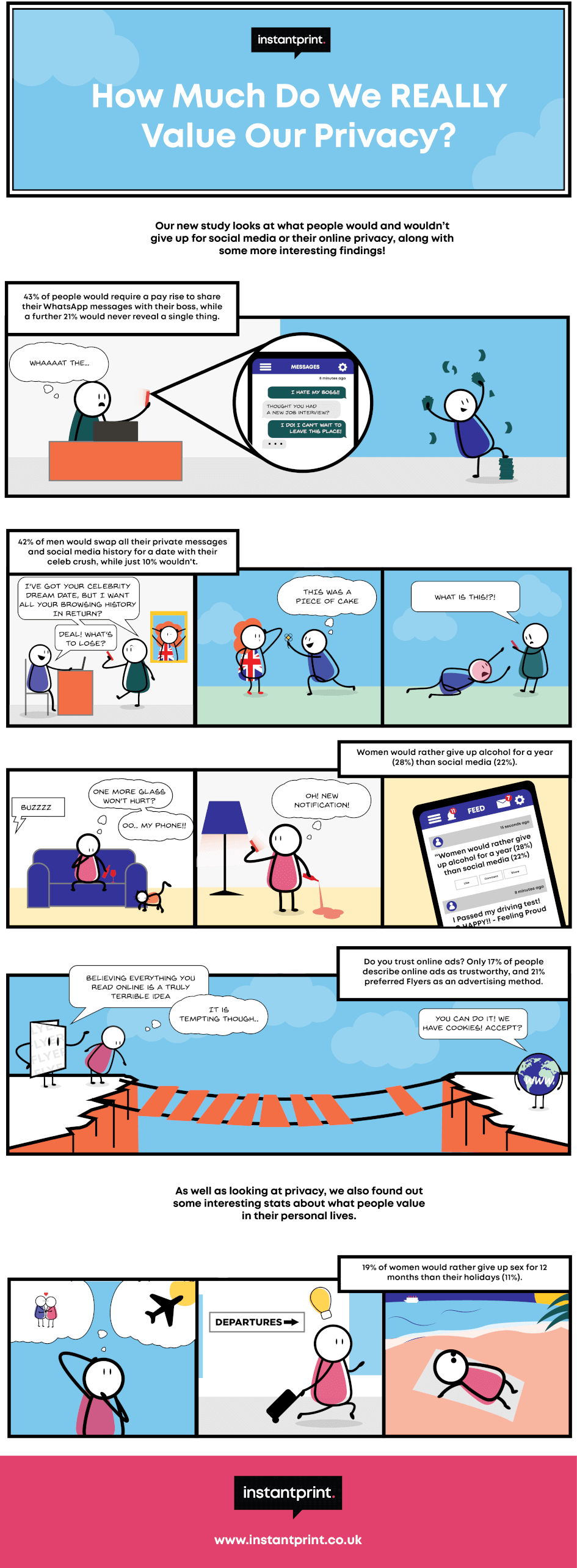Our Findings
We have released a survey with 500 smartphone users across the UK in order to see what we would sacrifice for our privacy.
Our findings show that both men and women are particularly protective of their personal data where their friends and family are concerned, as 65% of people would need at least £500 to reveal their browsing history to their friends and family.
Some 43% would also need a pay rise to reveal their WhatsApp messages to their boss, while a further 21% would rule the possibility out completely.
Results varied by gender, as 28% of women would rather give up alcohol for a year than delete their social media accounts (22%), while men were more likely to delete their platforms (33%).
Do people trust Google more than their family and friends?
While over 1 billion of us are willing to trust Google to handle our browsing history for no price at all, it seems that people do not feel comfortable sharing the same information with their family and friends.
65% of people would need to be paid at least £500 to share their browsing history with their family and friends. Of these, 26% would need to be paid £50,000 or more!
If data is so private that you would need thousands of pounds to share it with your family and friends, should you be giving it away for free?
How do people view online ads?
The way companies gather data on us is becoming increasingly sophisticated and, sometimes, even a little creepy!
Our findings, gathered by Atomik Research, suggest that the view on online ads is mixed, while flyers and leaflets are typically viewed in a positive light.
43% of respondents described online ads as the most intrusive form of marketing, whereas flyers were seen to be the least intrusive (7%). Flyers (21%) were also viewed as the most trustworthy form of marketing, above online ads (17%).
The results suggest that, while companies devote time and money to collecting data and tailoring ads, this approach does not necessarily lead to consumer trust. Could we see marketers adopt less intrusive approaches in the future?
Would you share WhatsApp messages with your boss?
We all have group chats and, quite often, they're a huge source of work gossip. WhatsApp is typically the prepared platform, as its encryption adds an extra layer of security for users.
When asked if they people would show their boss their WhatsApp messages, 43% would require a pay rise to reveal the information. Of these, 26% would need at least £50,000! A further 21% would never consider sharing the data.
However, people are willing to give up their personal data to further their career. When asked what they would give up for their dream interview, staff would rather give their interviewer their browsing history (22%) or personal photos and videos (18%) than go through the interview with their parents (13%) or ex in the room (4%).
Are we addicted to social media?
When we asked people whether they use social media too much, it's easy for people to point to someone else who uses it more, so the best way to judge our relationship with the platforms is to compare them to other pleasures.
We asked whether people would rather give up social media, sex, alcohol, holidays or seeing family for a year, or delete their social media accounts permanently:
- 28% of women would rather give up alcohol for a year than delete their social media accounts (22%).
- 19% of women would rather give up sex for 12 months than chocolate (15%) or their holidays (11%).
- 33% of men would rather delete their social media accounts permanently and only 6% of men would give up sex for 12 months.
- Just 5% would rather avoid their family for a year than give up their other pleasures.
Social media is clearly now a vital part of many people's lives and it's clear that, while recent data scandals have rocketed technology giants like Facebook, our love affair with social media continues.
On the other hand, the findings suggest that the intrusive nature of online ads could be having a damaging effect on consumer trust.
It's clear that people value their personal data, but our results show it could get them into some sticky situations, which we've created in comic strip form below!



